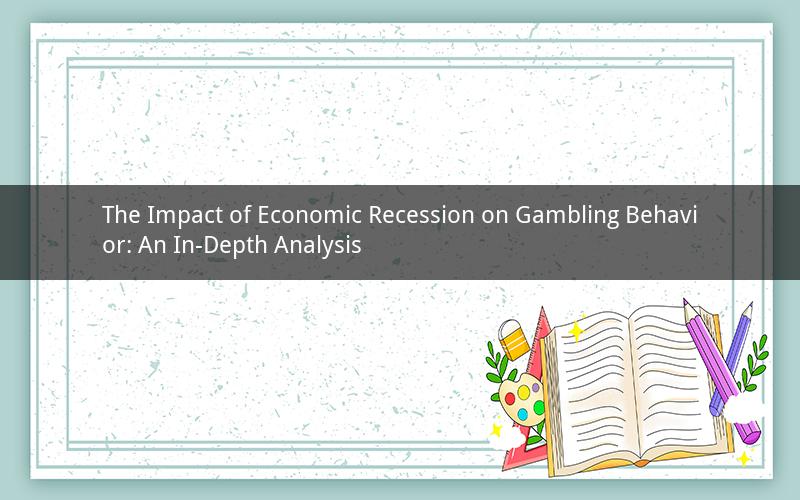
Introduction:
Economic recessions are periods characterized by a decline in economic activity, often marked by rising unemployment rates, reduced consumer spending, and a general decrease in the overall wealth of individuals. During such times, people often seek alternative ways to cope with financial stress and the uncertainty of the future. One such activity that tends to increase during recessions is gambling. This article delves into the reasons behind this trend and examines the factors that contribute to the rise in gambling behavior during economic downturns.
The Relationship Between Economic Recession and Gambling:
1. Financial Stress:
During economic recessions, individuals and families face significant financial stress due to job losses, reduced income, and the rising cost of living. This financial strain can lead to increased gambling as individuals look for ways to alleviate their financial worries or even make money. The allure of quick and easy money often makes gambling seem like a viable solution, despite the high risks involved.
2. Accessibility of Gambling:
The rise of online gambling platforms has made gambling more accessible than ever before. During economic downturns, individuals may turn to online gambling as a way to escape the reality of their financial struggles. The convenience and anonymity offered by online platforms make it easier for people to engage in gambling activities without leaving their homes.
3. Psychological Factors:
Economic recessions can have a significant impact on individuals' mental health, leading to increased stress, anxiety, and depression. These psychological factors can make individuals more susceptible to gambling as a coping mechanism. Gambling provides a temporary escape from reality and can give individuals a sense of control or relief, even if it is short-lived.
4. Peer Influence:
During economic downturns, people often seek support and comfort from their friends and family. If a person in a social circle engages in gambling, others may be influenced to try it as well. The desire to fit in or not be seen as a burden can push individuals to take up gambling, even if they have never done so before.
5. Marketing Strategies:
Gambling industries often capitalize on economic recessions by advertising their services as a way to escape financial stress. The availability of enticing marketing messages can further encourage individuals to engage in gambling during difficult economic times.
The Consequences of Increased Gambling During Economic Recession:
1. Financial Loss:
The most immediate consequence of increased gambling during a recession is the potential for significant financial loss. Many individuals who turn to gambling as a way to make money may end up losing more than they can afford, leading to further financial stress and hardship.
2. Increased Mental Health Issues:
Gambling can exacerbate mental health issues, particularly during economic downturns. Individuals who engage in excessive gambling may experience increased levels of stress, anxiety, and depression, which can have long-term implications for their mental well-being.
3. Social and Family Struggles:
Gambling addiction can lead to strained relationships, as individuals may prioritize their gambling activities over their responsibilities to their families and friends. This can result in social isolation, increased conflict, and even the breakdown of relationships.
4. Criminal Activity:
In some cases, individuals who engage in excessive gambling during a recession may turn to criminal activities to fund their addiction. This can lead to an increase in theft, fraud, and other illegal activities, further exacerbating the negative impact of the recession on society.
5. Economic Impact:
The increased gambling during a recession can also have a broader economic impact. As individuals lose more money to gambling, they have less disposable income to spend on other goods and services, which can further slow down economic recovery.
Conclusion:
The relationship between economic recession and gambling behavior is complex and multifaceted. While some individuals may turn to gambling as a way to cope with financial stress, the potential consequences of increased gambling during a recession are significant. Understanding the factors that contribute to this trend is crucial in developing effective strategies to mitigate the negative impact of gambling on individuals, families, and society as a whole.
Questions and Answers:
1. How does economic recession affect the availability of gambling options?
Economic recession can make gambling more accessible as individuals seek alternative ways to cope with financial stress. The rise of online gambling platforms has also made gambling more convenient and easily accessible during tough economic times.
2. Can gambling addiction be considered a coping mechanism for economic stress?
Yes, gambling can be considered a coping mechanism for economic stress. It provides individuals with a sense of control and a temporary escape from their financial worries, despite the high risks involved.
3. Are there any long-term consequences of increased gambling during a recession?
Yes, increased gambling during a recession can have long-term consequences, including financial loss, increased mental health issues, social and family struggles, and an exacerbation of criminal activity.
4. How can governments address the issue of increased gambling during a recession?
Governments can address the issue of increased gambling during a recession by implementing stricter regulations on gambling industries, providing resources for individuals struggling with gambling addiction, and promoting responsible gambling practices.
5. What can individuals do to protect themselves from the negative impact of gambling during a recession?
Individuals can protect themselves from the negative impact of gambling during a recession by setting limits on their gambling activities, seeking support from friends and family, and seeking professional help if they feel they are developing a gambling addiction.